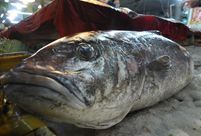 Bikini show in 2014 China Final of Miss Tourism World
Bikini show in 2014 China Final of Miss Tourism World
 Close-up view of August Aerobatic Team
Close-up view of August Aerobatic Team
 Goddesses married in 2014
Goddesses married in 2014
 Polar region photos raise worldwide awareness of global warming
Polar region photos raise worldwide awareness of global warming
 Get off at the last stop — Beijing Subway in vision
Get off at the last stop — Beijing Subway in vision
 Top 100 beauties in the world!
Top 100 beauties in the world!
 Gallery: Who is the most beautiful one?
Gallery: Who is the most beautiful one?
 If you like autumn, put your hands in the air!
If you like autumn, put your hands in the air!
 Fan Bingbing's "Queen style" in new play
Fan Bingbing's "Queen style" in new play
 Lingerie show at 2014 Miss China
Lingerie show at 2014 Miss China
WASHINGTON, Dec. 16 -- U.S. space agency NASA said Tuesday its Mars Curiosity rover has measured a tenfold spike in methane, a potential sign of life, in the atmosphere around it and detected other organic molecules in a rock-powder sample collected by the robotic laboratory's drill.
"This temporary increase in methane -- sharply up and then back down -- tells us there must be some relatively localized source," Sushil Atreya of the University of Michigan, a member of the Curiosity rover science team, said in a NASA statement. "There are many possible sources, biological or non-biological, such as interaction of water and rock."
Researchers used Curiosity's onboard Sample Analysis at Mars ( SAM) laboratory a dozen times in a 20-month period to sniff methane in the atmosphere.
During two of those months, in late 2013 and early 2014, four measurements averaged seven parts per billion. Before and after that, readings averaged only one-tenth that level.
Curiosity also detected different Martian organic chemicals in powder drilled from a rock dubbed Cumberland, the first definitive detection of organics in surface materials of Mars.
NASA said these Martian organics could either have formed on Mars or been delivered to Mars by meteorites.
Organic molecules, which contain carbon and usually hydrogen, are chemical building blocks of life, but they can also exist without the presence of life.
That meant Curiosity's new findings are not enough to reveal if Mars has ever harbored living microbes, but the findings do shed light on a chemically active modern Mars and on favorable conditions for life on ancient Mars, NASA said.
"We will keep working on the puzzles these findings present," said John Grotzinger, Curiosity project scientist of the California Institute of Technology in Pasadena. "Can we learn more about the active chemistry causing such fluctuations in the amount of methane in the atmosphere? Can we choose rock targets where identifiable organics have been preserved?"
Researchers also reported that Curiosity's taste of Martian water, bound into lakebed minerals in the Cumberland rock more than three billion years ago, indicates the planet lost much of its water before that lakebed formed and continued to lose large amounts after.
The results of the Curiosity rover which has been exploring the Red Planet since it landed in 2012 were discussed Tuesday at the American Geophysical Union's convention in San Francisco.
The methane results are described in a paper published online in the U.S. journal Science while a report on organics detection in the Cumberland rock is pending publication.
 Unknown 'monster' fish caught in Shandong
Unknown 'monster' fish caught in Shandong 20 years on: Relocated Three Gorges residents through lens
20 years on: Relocated Three Gorges residents through lens PLA HK Garrison veterans leave behind beautiful smiles
PLA HK Garrison veterans leave behind beautiful smiles Chestnut girl goes viral online
Chestnut girl goes viral online Beautiful Chinese woman
Beautiful Chinese woman Representative beauties
Representative beauties Victoria's Secret Fashion Show
Victoria's Secret Fashion Show Excellent photos of Zhuhai Air Show
Excellent photos of Zhuhai Air Show In photos: Bright and brave female soldier of PLA
In photos: Bright and brave female soldier of PLA A touch of salt
A touch of salt Open Internet not at odds with regulation
Open Internet not at odds with regulation Shanghai-HK stock plan adjusted
Shanghai-HK stock plan adjusted Experts, public torn on making APEC auto restrictions permanent
Experts, public torn on making APEC auto restrictions permanentDay|Week|Month